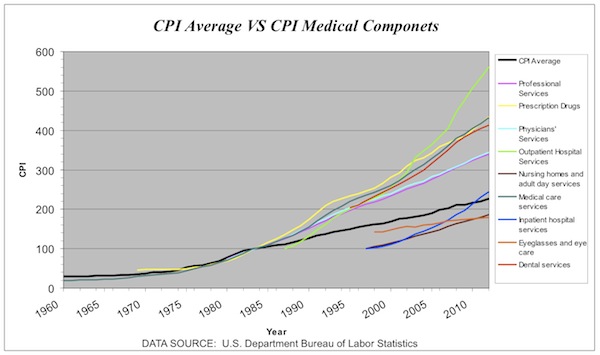
A cardinal rule of problem-solving is to accurately define the problem before a solution is applied. Ostensibly, the Obamacare and Romney proposals both miss the point, as they will be cost-prohibitive if implemented. Given the growth rates of annual cost, the total health care bill will exceed the GDP. As shown in the graph below, it is the outrageous increase in annual costs of the components of health care.

The inflation rate of CPI (average consumer price index) is compared with the various components of health care inflation. As can be seen, between 1960 and 1985 for 25 years the costs of the components of health care and CPI coincided and those prices were reasonable and affordable. However, since the mid-'80s, the components of health care entered an un-brittle wild spiral of inflation and by the year 2012 they have rendered the U.S. economy near bankrupt. Who are the culprits? Based on the CPI chart, empirical evidence shows that the major culprits are the pharmaceuticals, private physicians, hospitals, and others. All of them have a CPI that is significantly greater than the current CPI average. They all engaged in monopolistic rent, and shifted national wealth to their advantage in the absence of competition and regulation. The excessive annual profits of the pharmaceutical companies, the earnings of physicians, and salaries of health administrators are obscene. In the U.S. alone, the pharmaceutical manufacturers have combined annual revenue of about $200 billion.
Indeed, the pharmaceutical companies are entitled to recoup their investment when they develop new medicine plus a reasonable rate of return (market rate) on their investment, but it should not be the obscene profits that they have been collecting. The same or similar rules should apply to the industry at large. We should recognize that health care is a natural monopoly like utility companies, and therefore their prices should be regulated and must correspond to their costs plus reasonable returns. Since the demand for health care is relatively fixed, or what economists call inelastic, the suppliers can raise prices unabated in the absence of regulation and competition.
Clearly, Obama's and Romney's plans overlook many of these cost issues. Obama's major focus is to make sure that all Americans have insurance by enforcing government regulations against private insurance companies, yet 48.6 million Americans still do not have any health insurance. In return, Obama plans to spend $2.6 trillion over the next decade through the new Obamacare reform. Outright, the major problem with this plan is the cost. Rather than creating a new bureaucracy to handle a government health care plan, it would be more efficient to use the existing Medicare system that is already in place and make it universal. Not only would this allow for faster transition into a U.S. health care-sponsored plan, but it would be much more efficient and less costly since no new establishment would be necessary. It follows that the re-allocation of $716 billion from Medicare to Obamacare is the wrong approach. Medicare has worked successfully for seniors and it should be expanded to all citizens under the same rule of Medicare tax. Obama's universal mandatory requirement to buy private insurance will be unnecessary.
Romney, on the other hand, intends to slowly eliminate the current Medicare system and create a voucher-based program undoubtedly; this would not be an advantageous plan for U.S. citizens because such a plan would be much more expensive than having coverage under an expanded Medicare program. The major issue with a voucher program is that it will allow top-tier U.S. insurance companies to continue monopolistic practices and colluding like they have in the past. Not only will this harm consumers with higher prices, but it can even harm physicians by getting substantially underpaid, losing millions. The only ones that will profit the most are the top insurance companies and administrators.
Economically, the best solution and cure for U.S. health insurance is to interject competition (domestic and foreign) and regulate prices. This can all be accomplished by simply making the current Medicare plan universal to cover every citizen of the U.S. regardless of age and income. The costs for the plan could be covered under Social Security Medicare tax just as Medicare is covered today. Medicaid should be abolished and its coverage should be included under Medicare. And since many young people would now be included in the program, the cost of Medicare will decline substantially. This is simply due to the fact that young people as a whole have less health care-related problems than seniors. Moreover, there would be no need to create a new administration because Medicare is already in place and has several years of experience with an overhead cost of less than 4 percent. This expanded Medicare plan would eliminate the need for the compulsory purchase of private insurance under Obamacare, a great advantage since current insurance rates are very high and many people cannot afford it. And under an expanded Medicare program, people would still have the option to purchase private insurance if they wish for additional benefits.
Taken as a whole, it is critical that the health care plans developed from the political oppositions between Obama and Romney are disregarded. Instead, it is necessary to recognize the economic reasoning that establishes which health care plan is affordable for the U.S. economy and its people. Evidently, spending an additional $2.6 trillion on a reform, or destroying a well-established Medicare system is not optimal. The U.S. ought to employ the efficient Medicare health care system that currently exists, and simply expand on it. Senior citizens in the U.S. are privileged to have access to Medicare, and so should every other citizen regardless of their age or income.